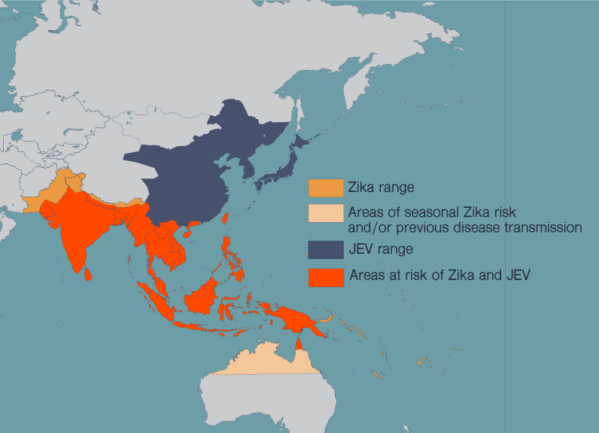LA JOLLA, CA—With support from the National Institutes of Health’s National Institute for Allergy and Infectious Diseases (NIAID) and the e-ASIA Joint Research Program (e-ASIA JRP), Professor Sujan Shresta, Ph.D., is launching new research into the spread of coronaviruses and flaviviruses in Nepal, Thailand, Vietnam and the Philippines. These new projects will shed light on how infectious diseases, such as COVID-19 and dengue, spread in these countries—and how differences in geography and genetics affect immune responses.

For each of these projects, Shresta’s long-term goal is to strengthen global health by supporting local scientists in these countries and building up their scientific infrastructure. Scientists around the world could then track the emergence of viral strains, no matter where they arise.
“Science really benefits from having a diversity of opinions and people,” says Shresta. “If there is one thing COVID-19 demonstrated for all of us, it is that we can’t wait for a virus to be in the U.S. to worry about it. Surveillance programs and research need to happen on a global scale.”
For the NIAID project, Shresta is joining the Center for Research in Emerging Infectious Disease-Epidemiology, Surveillance, Pathogenesis (CREID-ESP), led by Professor David Wang, Ph.D., of the Washington University School of Medicine in St. Louis. The CREID-ESP is an international effort, and Shresta is co-leading the Nepal research team with Professor Krishna Manandhar of Tribhuvan University in Kathmandu, Nepal’s top research university. Shresta and Manandhar are working with scientists in Nepal to follow a large group of Nepalese volunteers and study how their immune systems react to coronavirus infections and flaviviruses, such as dengue virus.
Shresta came to the United States as a child but was born in Nepal. She says that in the past, many research collaborations between U.S. and Nepali scientists tended to be one-sided, with Nepali scientists only asked to provide patient samples to Western labs—a process that often creates tensions and slows down epidemiology work. Shresta says researchers in the United States and Nepal can both benefit from forming true partnerships where scientists in both countries lead key aspects of the work.
“This is the first NIH grant of this scale for Nepal,” says Shresta. “And by working with Tribhuvan University, we’ll have access to some of the brightest students in the country.”
This collaboration is especially valuable for studying how mosquito-borne viruses spread. Unlike anywhere else in the world, Nepal has regions where the elevation goes from nearly sea level to the height of the Himalayas in just 100 miles. This means scientists can easily track how disease-carrying mosquitoes navigate new habitats.
“The mosquitoes that spread viruses such as dengue are moving from subtropical to more temperate and hilly habitats,” Shresta says. “If we can understand how that is happening in Nepal, we could prevent that from happening in other parts of the world, such as in the U.S., where Dengue is already endemic in Florida, and might start to move north with climate change.”
The researchers will also study how people with Nepali backgrounds and genetics respond to dengue virus, compared to Caucasians. “We know the immune system is different depending on genetics,” Shresta says. “The immune system is also shaped by the environment—how you grew up, your diet and your exposure to other pathogens.” Looking at different populations might provide valuable insights for developing vaccines and therapies.
Shresta’s work truly is global, and her new e-ASIA grants will shed light on dengue infections in Vietnam and Thailand and SARS-CoV-2 infections in Vietnam and the Philippines.

The dengue project addresses an especially pressing health concern: The spread of dengue virus in areas where Zika virus and Japanese encephalitis virus (JEV) are also a threat. Previous studies in the Shresta laboratory have shown that infection with one of these related flaviviruses can affect disease severity when another flavivirus attacks. For this e-ASIA project, she will be working closely with Japanese researchers and hospitals and scientific leaders in Vietnam and Thailand to study virus-host interactions.
For each of these projects, local scientists will helm aspects of the research, and labs will send their trainees abroad to learn new skills. LJI Instructor Annie Elong Ngono, Ph.D., will travel to Vietnam and Thailand, and gain first-hand experience in how to set up a cohort study. “The physicians in Vietnam and Thailand are experts in that,” Shresta says.
The funding for the e-ASIA grants is also unique; each participating country is funding their side of the work. For Shresta, this approach puts the labs on even footing.
“This is about surveillance and trying to prevent new pathogens from getting out of control,” says Shresta. “We’re also training the next generation of emerging infectious disease researchers.”
The CREID-ESP is supported by the National Institute of Allergy and Infectious Diseases of the National Institutes of Health (grant U01AI151810). The e-Asia projects are also supported by the National Institute of Allergy and Infectious Diseases of the National Institutes of Health via CRDF Global.
Role of the pre-existing immunity to Japanese encephalitis and Zika viruses in influencing dengue disease outcome and vaccination program in Vietnam and Thailand” to be conducted jointly by: USA: Sujan Shresta, Associate Professor, La Jolla Institute for Immunology Vietnam: Thi Quynh Mai Le, Vice Director, National Institute of Hygiene and Epidemiology Thailand: Montarop Yamabhai, Director of Molecular Biotechnology, Suranaree University of Technology.
“Long-term immunity to SARS-CoV-2 in influencing COVID-19 disease outcome in Asia” to be conducted jointly by: Japan: Meng Ling Moi, Professor, Nagasaki University USA: Sujan Shresta, Associate Professor, La Jolla Institute for Immunology Vietnam: Thi Quynh Mai Le, Vice Director, National Institute of Hygiene and Epidemiology Philippines: Kathryn Roa, Infectious Disease Specialist, Southern Philippines Medical Center.
###




